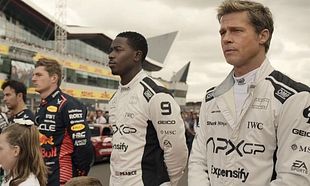A woefully miscast George Clooney plays a brash television personality who's taken hostage by Jack O'Connell in an attempt to explain how all his money's disappeared. With a star-studded cast that includes Julia Roberts, Caitriona Balfe and Dominic West, it's a decent enough thriller that loses its steam in the third act...
Since the financial crash, there's been a surge in films and documentaries that have tried to take on the subject. Some have been very good - Margin Call, The Big Short - and others have, well, failed to do anything meaningful with them. Uwe Boll's horrendously bad Assault On Wall Street being one of particular note. The through line them all has been that the little man has been squeezed and pushed around by the system, but in all cases, they never get a say in the matter. Enter Money Monster, a Dog Day Afternoon-esque thriller that puts the little man front and centre.
Jack O'Connell is Kyle, an everyman who lost his entire life savings when he bought shares in a company that was relentlessly pushed by TV financial guru George Clooney. The company's shares fell through the floor and, naturally enough, Jack O'Connell lost every cent he had. So, in an crazed attempt to figure out what happened and get an explanation, Jack O'Connell's character storms the TV studio where Clooney works and straps a bomb to his chest. Julia Roberts, Clooney's long-suffering director, tries to manage the situation and move things along. Meanwhile, the company's spokeperson (Caitriona Balfe) is trying to figure out exactly what happened with her own company that's headed by Dominic West.
Money Monster doesn't try to preach the message of Banks Are Evil Corporations that one could easily have assumed from the trailers and everything else. Instead, Jodie Foster's smart enough to know that the film works best when it's a hostage thriller ala Dog Day Afternoon or Inside Man. The failure is, however, is that one third of the central leads are horribly miscast - namely George Clooney.
Can you really buy Clooney as some dogged, Jim Cramer type? Of course not. But, bless him, Clooney gives it his best shot. While it's true, most of his performance is about being under pressure as opposed to be loud and over-the-top, it still doesn't ring true to see Clooney dancing alongside hip-hop dancers and rambling on about stocks. Jack O'Connell, however, more than makes up for Clooney's shortfalls and gives an incredibly human performance. You can see the sweat coming out of his pores as he rants and raves.
Julia Roberts, also, is excellent as the level-headed director who's just trying to work her way out of the situation.As we mentioned, the film begins to fall apart when it moves away from the studio. The film shifts gear in the second half when it turns into an investigation into the company with whom Jack O'Connell lost all his money. Caitriona Balfe and Dominic West play the faceless corporation who are trying to worm their way out of responsibility, but the story and pacing begins to sag whenever it moves over to them.
Visually, Jodie Foster knows how to cut and shoot a tense, dramatic scene. There's a lot less flourish and pomp to it all, but it doesn't fall over into the realm of shaky-cam or documentary-style filmmaking. Instead, it's lean and sparse with a strong narrative running through it. The script, as well, is split into two halves, with the first half of the film - set mainly in the studio - being the best part. It's realistic without being boring, it's tense without being needlessly so and there's even a whiff of comedy here and there to the proceedings. It all comes apart, however, when the action leaves the studio and we're treated to the eventual preachy ending, which contradicts what came before.
Money Monster starts off as a detached thriller that's set in the financial world, but by the end, it's relegated to another preachy monologue about how the system is utterly corrupt. While that may be true, it seems like laziness to use it as a way to round out what could have been a great film. As it stands, it's pretty good - but just that.

















































































